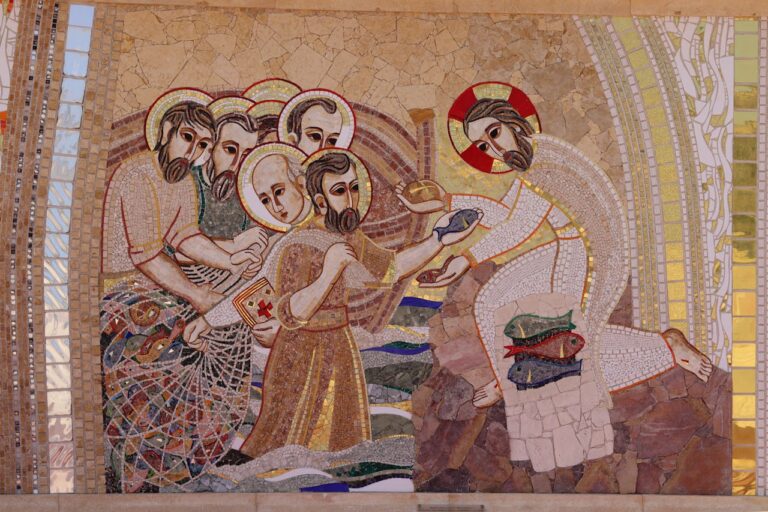We live in a time when few people have difficulty believing in a God of love. Some central texts in Scripture emphasize this point. Here are a couple key passages emphasizing God’s love, one from the Old Testament and the other from the New Testament:
“[God] passed in front of Moses, proclaiming, ‘The Lord, the Lord, the compassionate and gracious God, slow to anger, abounding in love and faithfulness, maintaining love to thousands, and forgiving wickedness, rebellion and sin. Yet he does not leave the guilty unpunished; he punishes the children and their children for the sin of the parents to the third and fourth generation.’” (Exodus 34:6-7, NIV)
“For God so loved the world that he gave his one and only Son, that whoever believes in him shall not perish but have eternal life.” (John 3:16, NIV)
The message of God’s mercy, grace, and loving kindness has been clearly taught in most churches and is emphasized by church leaders, writers, and podcasters.
And yet, there is also clear teaching in Scripture that not everyone will turn from their sin and receive the grace of Jesus.[1] The destination of the unrepentant will be eternal separation from God. There are many aspects to the teaching of God’s Word on hell, but for our purposes, we will focus on five.
- We must understand God’s holiness to understand hell.
- Hell is the destination of those whose sin is not removed by Jesus’ sacrificial atonement.
- Hell will be worse than anything that can be experienced in this life.
- There will be different degrees of punishment in hell.
- Hell will be a final, irreversible punishment.
First, to understand hell, we must first understand God’s holiness.
Let’s start by returning to Exodus 34:6-7 (quoted above). It is a central text in the Bible, repeated many times. For all its emphasis on God’s love, notice how the passage ends:
“Yet he [God] does not leave the guilty unpunished; he punishes the children and their children for the sin of the parents to the third and fourth generation.” (Exodus 34:7b, NIV)
In a North American context, it is not difficult to believe in a God of love, but our readiness to believe in a holy, just, and righteous God who punishes people for their disobedience and sin is another matter. But we take the Bible as our guide—and we must not shrink back at this point. It clearly teaches that God will hold the unrighteous accountable, and they will enter a place of eternal punishment.
Before we consider the biblical passages in detail, it will be helpful for us to stop and briefly consider God’s nature. Both love and holiness are dominant in God’s character; one does not cancel the other. And Scripture’s definition of love differs from the lenient, affirming type of “love” that people often want from God. If this form of “love” were how God loves us, then Adam and Eve would never have been banished from the Garden of Eden. God would have never sent the flood in Noah’s time or the plagues in Moses’ time. In fact, God would never have punished anyone in history. To understand God properly, we must recognize that his love cannot be considered without also giving due recognition to his holiness, justice, and righteousness.
“To understand God properly, we must recognize that his love cannot be considered without also giving due recognition to his holiness, justice, and righteousness.”
Here is the truth in Scripture about God’s holiness. God is holy and sin cannot stand in the presence of a holy God—unless sin is taken away. An encounter with God described in Isaiah 6 gives us a good picture of this reality. The prophet Isaiah was able to get a picture or a vision of God in all of his holiness. Note what the angels in God’s presence said to each other:
“And they were calling to one another: ‘Holy, holy, holy is the Lord Almighty; the whole earth is full of his glory.’” (Isaiah 6:3, NIV)
This clear picture of God’s holiness led to Isaiah’s reaction:
“‘Woe to me!’ I cried. ‘I am ruined! For I am a man of unclean lips, and I live among a people of unclean lips, and my eyes have seen the King, the Lord Almighty.’” (Isaiah 6:5, NIV)
Isaiah knew instantly that because of the sin in his life, he could not be in God’s presence. He literally said, “Woe to me!” and “I am ruined.” This is the only logical reaction we can have in the presence of a holy God because sin is a part of each of our lives.
But God then showed Isaiah the key to being in a holy God’s presence. The angel took a coal from the altar (representing a sacrifice for Isaiah’s sin). Isaiah then describes how his sin was atoned for in Isaiah 6:7.
“With it he touched my mouth and said, ‘See, this has touched your lips; your guilt is taken away and your sin atoned for.’” (Isaiah 6:7, NIV)
“God is holy and sin cannot stand in the presence of a holy God—unless sin is taken away.”
God has no choice but to punish sin and those who sin. It is God’s nature, apart from sacrifice for sin, that he must be fully holy and just. He would fail to be holy and just if he did not give the proper punishment for sin and evil actions. To do less than this would require God to be less than himself. To impose the punishment of eternal separation on sinful, rebellious people, who do not receive the sacrifice of Jesus for sin, is the only option for a just and holy God.
The word often used to describe this punishment is “hell.” English Bibles translate various Greek words into our English word “hell.” In the teachings of Jesus, the word most commonly used is a translation of the Greek word “Gehenna.” Most likely, Gehenna was originally a valley southeast of Jerusalem where garbage, dead bodies, and other refuse was thrown. An analogous description of judgment is found in Isaiah 66:24:
“And they will go out and look on the dead bodies of those who rebelled against me; the worms that eat them will not die, the fire that burns them will not be quenched, and they will be loathsome to all mankind.”
It is the imagery that Gehenna brought to the minds of the early disciples that served as a symbol of the eternal state of the enemies of God. It was just as frightening then as it is now.
Second, hell is the destination of those whose sins are not removed by the sacrifice of Jesus.
The judgment of unbelievers in eternity will show the ramifications of the sin and rebellion against God in their decisions made in this life. Before I (Bobby) became a disciple of Jesus, I used to hear that I would go to hell if I did not believe in Jesus. That statement sounded wrong to me. I thought to myself, I am doing fine. I’m a basically good person. But they’re saying if I don’t believe in Jesus (for my own good reasons), then God is going to punish me?! Not only did I have trouble understanding why he would punish me, but I also couldn’t get why he was also going to punish all those sincere people in other religions just because they would not turn to Jesus.
Yet my problem was grounded in a false framework. I assumed God’s love—and that’s about it. How could a loving God send anyone to hell? I thought. I only have a few minor flaws, like most other people I know. On a grading curve, there are a lot of people worse than me. Furthermore, I thought of hell only as a punishment for those who rejected Jesus, not considering the depth of my sins apart from God’s grace.
“I thought of hell only as a punishment for those who rejected Jesus, not considering the depth of my sins apart from God’s grace.”
But here is the framework given to us in God’s Word. God is holy and just, and because of that, our sin (and our ongoing sinfulness) keeps us from being in relationship with him. This is the case even though he loves humanity. From this perspective, a more appropriate question than “How can a loving God send people to hell?” is “How can a holy God not give sinners over to the separation from God that they have chosen?” We struggle with the Bible’s teaching of hell insofar as we struggle to see sin as that big of a deal. And then, for the same reason, we struggle to appreciate his love as deeply as we should.
Because God is also loving, he offers to take away our sin through the sacrifice of Jesus. Those who see their sin as a big deal are the most likely people to see their own need for Jesus’ sacrifice; when we don’t see sin as utterly sinful, it’s easy to view Jesus’ sacrifice as less-than necessary. It is for those aware of the sinfulness of their sin that the gospel of Jesus is the best news ever. First John 2:1-2 (NIV) resonates with people who have this awareness:
“My dear children, I write this to you so that you will not sin. But if anybody does sin, we have an advocate with the Father—Jesus Christ, the Righteous One. He is the atoning sacrifice for our sins, and not only for ours but also for the sins of the whole world.”
“He is the atoning sacrifice for our sins, and not only for ours but also for the sins of the whole world.”
A careful reading of the context of John 3:16 also teaches this truth. Many people know what John 3:16 says, but it’s easy to miss the sober context given in the verses that come after verse 16:
“For God so loved the world that he gave his one and only Son, that whoever believes in him shall not perish but have eternal life. For God did not send his Son into the world to condemn the world, but to save the world through him. Whoever believes in him is not condemned, but whoever does not believe stands condemned already because they have not believed in the name of God’s one and only Son. . . . Whoever believes in the Son has eternal life, but whoever rejects the Son will not see life, for God’s wrath remains on them.” (John 3:16-18; 3:36, NIV)
So, the fundamental human problem is that we are all separated from God and deserving punishment because of our sin. Apart from Jesus, we stand condemned (John 3:18), and God’s wrath (judgment and punishment) remains on us. We need the cleansing, forgiveness, and mercy for our sins that is only provided by Jesus and his sacrifice for our sins.
Again, because our sin remains with us, and we thus deserve punishment by a holy God, Scripture teaches that those who do not possess the Son of God do not have life (1 John 5:12). Unbelievers will be punished according to their sins, and for this they have no one to blame but themselves (Romans 2:5ff).
“Because our sin remains with us, and we thus deserve punishment by a holy God, Scripture teaches that those who do not possess the Son of God do not have life.”
The Bible makes it abundantly clear, however, that God doesn’t want anyone to be lost (2 Peter 3:9). What God really wants is for all people to be saved and to come to the knowledge of the truth (1 Timothy 2:4).
Scripture teaches that God will save only the people who turn in faith to Christ.
“He will punish those who do not know God and do not obey the gospel of our Lord Jesus. They will be punished with everlasting destruction and shut out from the presence of the Lord and from the glory of his might on the day he comes to be glorified in his holy people and to be marveled at among all those who have believed.” (2 Thessalonians 1:8-10a, NIV)
Theologian Adrio Konig puts all this into perspective:
“God . . . determines to abandon the unbeliever, who refuses his help and will not tread the path back to happiness opened by God in his goodness. In this way God remains the king, the sovereign Lord, but the lost have no one but themselves to blame for their condition. This is in complete harmony with the New Testament preaching of damnation, according to which the damned are in every case themselves responsible for their state, never able to ‘answer God back’ (Romans 9:20).”[2]
Either our sins are taken away through Christ’s sacrifice, or we must go into eternity to pay the penalty ourselves. According to the explicit teaching of the Bible, these are the only two options left to us.[3] If God has another plan, he has not revealed it to us.
Third, the fate of the unrighteous in eternity will be worse than any fate that can be experienced in this life.
There are situations in this life often described as “hell on earth.” But none of these situations, as bad as they may be, are comparable to hell. Jesus warned people about hell with words such as these:
“If your hand or your foot causes you to stumble, cut if off and throw it away. It is better for you to enter life maimed or crippled than to have two hands or two feet and be thrown into eternal fire. And if your eye causes you to stumble, gouge it out and throw it away. It is better for you to enter life with one eye than to have two eyes and be thrown into the fire of hell.” (Matthew 18:8-9, NIV)
“I tell you, my friends, do not be afraid of those who kill the body and after that can do no more. But I will show you whom you should fear: Fear him who, after your body has been killed, has authority to throw you into hell. Yes, I tell you, fear him.” (Luke 12:4-5, NIV)
According to Jesus, to be maimed, crippled, or killed cannot compare with the horror of hell. Jesus hoped that this kind of warning would cause people to seriously consider their lives and repent. In the book of Revelation, John uses graphic language to describe the fate of those who chose to follow the dragon (Satan) instead of the lamb (Jesus). He says that their place is the fiery lake of burning sulfur—where the smoke of their torment rises forever and ever (Revelation 14:8-12; 20:11-15; 21:8).
What does the Bible say about hell? “In the book of Revelation, John uses graphic language to describe the fate of those who chose to follow the dragon (Satan) instead of the lamb (Jesus).”
Fourth, the Bible teaches that there will be different degrees of punishment in hell.
The unrepentant will be separated from God for eternity and punished, but not all will be punished to the same degree. As we mentioned earlier, the Bible teaches that God will be fair in his judgment (Romans 2:5ff; 1 Peter 1:17). God will punish people according to how they have lived, and some people have lived more corrupt lives than others. Some people have had also more opportunity to come to know Jesus than others. God will consider all of these factors. God knows everything about our lives and will judge us accordingly. Jesus put it this way:
“The servant who knows the master’s will and does not get ready or does not do what the master wants will be beaten with many blows. But the one who does not know and does things deserving punishment will be beaten with few blows. From everyone who has been given much, much will be demanded; and from the one who has been entrusted with much, much more will be asked.” (Luke 12:47-48, NIV)
This also explains why Jesus said that unrighteous religious leaders who make a show of their position and mistreat widows will be “punished most severely” (Mark 12:40). And it also explains why Jesus said that it would be more bearable for the people of Sodom on the day of judgment than it would be for the people of Chorazin and Bethsaida (Matthew 11:20-24).
What does the Bible say about hell? “Jesus said that it would be more bearable for the people of Sodom on the day of judgment than it would be for the people of Chorazin and Bethsaida.”
God is fair; he will punish people according to what they have done and what they deserve. The Bible teaches that there are eternal consequences to our actions. Eternal punishment is an eternal state that negatively parallels the joys of eternal life. It is the final place of universal justice—where everyone gets exactly what they deserve. Again, the seriousness of this truth should lead us to turn to God, who wants instead to shower us with love and the joys of eternal life.
Lastly, punishment in eternity of the unrepentant in hell is the mirror opposite of the blessings in eternity of the righteous in the new heaven and new earth.
Those who are blessed by their salvation will be blessed for eternity; those who are punished because of their sin will receive a punishment that has effects for eternity. Jesus pointed this out in his discussion on the final judgment in Matthew 25. He compared the righteous to sheep, who dedicated themselves to loving one another, and then he compared the unrighteous to goats, who did not. At the end of the parable, Jesus announced the final verdict for the two groups of people. Both went into eternity according to their actions, but they went in two entirely different directions.
“Then he will say to those on his left [the unloving “goats”], ‘Depart from me, you who are cursed, into the eternal fire prepared for the devil and his angels. For I was hungry and you gave me nothing to eat, I was thirsty and you gave me nothing to drink, I was a stranger and you did not invite me in, I needed clothes and you did not clothe me, I was sick and in prison and you did not look after me.’ . . . Then they will go away to eternal punishment, but the righteous to eternal life.” (Matthew 25:41-43, 46, NIV)
What does the Bible say about hell? “Then they will go away to eternal punishment, but the righteous to eternal life.”
The Bible often speaks of the destiny of the righteous as “eternal life” (John 3:16), and the destiny of the unrighteous as “everlasting destruction” or “eternal punishment” (2 Thessalonians 1:9). In Mark 9, Jesus described hell, using imagery out of Isaiah, as the place where “their worm does not die, and the fire is not quenched.” Jesus quotes from this passage in Mark 9:43-48 (NIV):
“If your hand causes you to stumble, cut it off. It is better for you to enter life maimed than with two hands to go into hell, where the fire never goes out. And if your foot causes you to stumble, cut it off. It is better for you to enter life crippled than to have two feet and be thrown into hell. And if your eye causes you to stumble, pluck it out. It is better for you to enter the kingdom of God with one eye than to have two eyes and be thrown into hell, where ‘the worms that eat them do not die, and the fire is not quenched.’”
In contrast to the promise of blessings that last forever, Jesus warned the unrighteous that the consequences of their punishment would also last forever.[4]
What does the Bible say about hell? “Jesus warned the unrighteous that the consequences of their punishment would also last forever.”
The only appropriate way to end this article is by urging us all to turn to Jesus so that we can have eternal life. And let’s urge everyone else we can to turn to Jesus, so that they will experience eternal life in the new heaven and new earth.
[1] We recommend two books for those who would like to investigate the doctrine of hell further. First and foremost, Francis Chan and Preston Sprinkle, Erasing Hell: What God Said about Eternity, and the Things We’ve Made Up (Colorado Springs, David C. Cook, 2011). Secondly, see Sprinkle, Burk, Stackhouse, Parry, and Walls, Four Views on Hell: Second Edition (Grand Rapids: Zondervan, 2016).
[2] Adrio Konig, The Eclipse of Christ in Eschatology (Grand Rapids: Eerdmans Publishing Co., 1989), 221-22.
[3] Many of us hope and pray that God will find a way to apply Christ’s sacrifice to seekers and God-fearing people who did not hear the gospel in their lives. But we have a responsibility to not go beyond Scripture on this point. So, we cling to the sure teachings of Scripture, working and reaching out to everyone who will listen. And all the while, we trust in God’s justice, goodness, and love, knowing that there may be more than what has been revealed and that the Judge of all the earth will do right (Genesis 18:25). See the wise warning by Robertson McQuilkin, The Great Omission (Grand Rapids: Baker Book House, 1984) and a discussion of related issues in Dennis Okholm and Timothy Phillips, More Than One Way? (Grand Rapids: Zondervan Publishing House, 1995).
[4] There are complex issues related to some of the details here. See William Crockett, Four Views on Hell (Grand Rapids, Michigan: Zondervan Publishing House, 1992).













3 Responses
Hello Pastors Walker and Harrington, thank you for this article. I commend anyone who is willing to address this difficult topic. I want to provide a little bit of pushback against what you are saying in this article though. I believe that your description here that hell is something that involves eternal conscious torment of the wicked is something which is driving people away from God’s kingdom. I believe that the reason that many preachers don’t even teach about hell is because God has written the truth on our hearts about this. The truth is that if we are invited to enter into a marriage with someone and that someone offers their love, but then says they will put us in a basement and torture us for 50 years if we don’t marry them, this is not an offer of love. There has to be a way out, or a way to voluntarily turn down the marriage proposal in order for that proposal to be a proposal which is accompanied by real love. God offering us eternal life or else being tortured for eternity is not a choice and does not allow us to see who God really is and what his love really is. It obscures our view of his kindness:
[Romans 2:4 NASB20] 4 Or do you think lightly of the riches of His kindness and restraint and patience, not knowing that the kindness of God leads you to repentance?
Would you advise your daughter or niece to accept a marriage proposal which is accompanied by a threat of 50 years of torture if she did not accept the proposal? This is likely why polling such as that done by McCrindle and olive tree media in Australia has shown repeatedly for many years that the mainstream concept of hell and judgment, which involves eternal conscious torment, is reported by non-christians as one of the biggest reasons why they want nothing to do with Christianity. The traditional view of hell as eternal conscious torment is not bringing people to God. It is driving them away. I have personally spoken with many of these people who have deconstructed from Christianity or simply stayed away for a long time until they learned more of what the Bible really says about hell. You’ve mentioned in your article that punishment is “eternal”, meaning that the torment lasts forever. This is in spite of the fact that the same Greek word, aionios, eternal is used in the New Testament to describe verbal nouns over and over again which by their very nature are not themselves things which last for eternity. They are things which have endless results. A few examples found in the New Testament are:
eternal sin
eternal salvation
eternal judgment
eternal redemption
None of these things above last for eternity. They are processes which are accomplished in a finite amount of time and then the results are endless. Considering all of the passages below, could eternal punishment also be in this category?
[Hebrews 10:26-27, 39 ESV] 26 For if we go on sinning deliberately after receiving the knowledge of the truth, there no longer remains a sacrifice for sins, 27 but a fearful expectation of judgment, and a fury of fire that will consume the adversaries. … 39 But we are not of those who shrink back and are destroyed, but of those who have faith and preserve their souls.
The author of Hebrews above is using the phrase “fire that will consume the adversaries” to intentionally contextualize his wording, “preserve their souls” in verse 39 above. Look below in Isaiah where the author of Hebrews is borrowing this fiery phrase from:
[Isaiah 26:11, 14, 19 CSB] 11 LORD, your hand is lifted up to take action, but they do not see it. Let them see your zeal for your people and be put to shame. Let fire consume your adversaries. … 14 The dead do not live; departed spirits do not rise up. Indeed, you have punished and destroyed them; you have wiped out all memory of them. … 19 Your dead will live; their bodies will rise. Awake and sing, you who dwell in the dust! For you will be covered with the morning dew, and the earth will bring out the departed spirits.
The content of Isaiah 26 above sounds a lot like Jesus in Matthew 10 here below. I noticed you mentioned the parallel version of this in Luke, but you didn’t mention this record of it from Matthew 10:
[Matthew 10:28 NASB20] 28 “And do not be afraid of those who kill the body but are unable to kill the soul; but rather fear Him who is able to destroy both soul and body in hell.
And then here’s Isaiah saying almost the same thing as Jesus above in regard to those who side with antichrist during the tribulation:
[Isaiah 10:17-18 NASB20] 17 And the Light of Israel will become a fire and Israel’s Holy One a flame, And it will burn and devour his thorns and his briars in a single day. 18 And He will destroy the glory of his forest and of his fruitful garden, both soul and body, And it will be as when a sick person wastes away.
And then considering the content of the passages I’ve just shown, is it possible that these Thessalonians verses below are translated properly, expressing the same concept? The Thessalonians verses below are about the day of the Lord, just as Isaiah 26 and Isaiah 10 above are:
[1 Thessalonians 5:2-3, 23 LSB] 2 For you yourselves know full well that the day of the Lord will come just like a thief in the night. 3 While they are saying, “Peace and safety!” then destruction will come upon them suddenly like labor pains upon a woman who is pregnant, and they will never escape. … 23 Now may the God of peace Himself sanctify you entirely, and may your spirit and soul and body be preserved complete, without blame at the coming of our Lord Jesus Christ.
And then we might see James adding onto the same theme here:
[James 5:19-20 NASB20] 19 My brothers and sisters, if anyone among you strays from the truth and someone turns him back, 20 let him know that the one who has turned a sinner from the error of his way will save his soul from death and cover a multitude of sins.
James above sounds a lot like Ezekiel here from the Septuagint:
[Ezekiel 18:4, 27 Lexham English Septuagint] 4 For all lives are mine; the way is the life of the father, so also the life of the son; they are mine; the soul that sins, this is the one that will die. ……. 27 But when a lawless person turns back from his lawlessness which he committed, and he does justice and righteousness, this one has kept his soul.
Of course what I’m hinting at here is the doctrine of annihilationism which describes that the wicked finally cease to exist after having received a just period of torment which is commensurate to the severity of their sins. In this view, part of the eternal punishment for sin is just death, and both its results and the process of it being administered both last forever. The wicked are just dead and gone forever, just as Jesus describes above in Matthew 10:28. They are endlessly being punished with death and the results are also endless they are endlessly dead:
[Romans 6:23 NASB20] 23 For the wages of sin is death, but the gracious gift of God is eternal life in Christ Jesus our Lord.
[John 3:16 NASB20] 16 “For God so loved the world, that He gave His only Son, so that everyone who believes in Him will not perish, but have eternal life.
Giving consideration to the doctrine of annihilationism of course runs us right into Revelation 14:11 and revelation 20:10 which seem so definitively to have no agreement with annihilationism whatsoever. In my latest work “Hell is Made Holy”, I tackle Revelation 14:11 and Revelation 20:10 to show how the language of the smoke going up forever is a reference to the Old Testament sacrificial system, not a description of endless torment. The smoke from the sacrificial system represents complete and utter destruction under God’s wrath, not endless torment. In regard to Revelation 20:10 there are eight Old Testament prophecies which foretell that satan will be killed in the future not tormented endlessly. These passages are Genesis 3:14-15; Matthew 4:5-6; Psalm 91:11-13; Romans 16:19-20; Habakkuk 3:12-13; Ezekiel 28:11-19; Isaiah 27:1; Job 26:12-13. To see a few:
[Isaiah 27:1 NASB20] 1 On that day the LORD will punish Leviathan the fleeing serpent, With His fierce and great and mighty sword, Even Leviathan the twisted serpent; And He will kill the dragon who lives in the sea.
[Ezekiel 28:13-14, 18-19 NASB20] 13 “You were in Eden, the garden of God; Every precious stone was your covering: The ruby, the topaz and the diamond; The beryl, the onyx and the jasper; The lapis lazuli, the turquoise and the emerald; And the gold, the workmanship of your settings and sockets, Was in you. On the day that you were created They were prepared. 14 “You were the anointed cherub who covers, And I placed you there. You were on the holy mountain of God; You walked in the midst of the stones of fire. … 18 “By the multitude of your wrongdoings, In the unrighteousness of your trade You profaned your sanctuaries. Therefore I have brought fire from the midst of you; It has consumed you, And I have turned you to ashes on the earth In the eyes of all who see you. 19 “All who know you among the peoples Are appalled at you; You have become terrified And you will cease to be forever.”‘”
I believe Revelation 14:11 and 20:10 are the only ones remaining that don’t elsewhere have a fully developed annihilationist interpretation. Many have proposed different solutions as to what the symbolism in these verses represents, but none have been able to make a very strong case to support their theories. If you or your readers would be interested in seeing the full evidence, you can easily find “Hell is Made Holy” for no green using just my name, David Aaron Beaty. Thank you again for your article and God bless you, your readers, and your ministry.
David – In my work I stick with describing hell strictly in Biblical terms where I self-consciously do not take a stand on eternal conscious torment or Ed Fudge’s view of conditional punishment, then annihilation. I’m sorry that you interpreted more than what I intended to say. There are many views about the nature of hell and I personally believe it’s best that we just stick with the text and not try to resolve some of the tensions. May God bless you.
What if the text and God’s Spirit is speaking to us loud and clear that conditional immortality is the biblical view? “Sticking with the text”, assumes that the text is not clearly telling us which view of hell is the biblical one. It assumes that God’s Spirit is not speaking to us clearly in the text on this issue. Please consider the possibility that God’s Spirit is moving through the spiritual gift of teaching that he has given to His people to use books like “Hell Is Made Holy”, “The Fire That Consumes”, “Rethinking Hell”, “The geography of hell in the teachings of Jesus”, and others to shine a light on where the text and the Holy Spirit are clearly revealing the truth to us on this issue. There’s really no need to not stick with the text on this issue. Maybe there is a need to recognize that God’s Spirit speaks to Spirit-filled teachers, such as you may be, through other Spirit-filled teachers to illuminate the text. If this was not true, then would we even see the spiritual gift of teaching mentioned at all in the New Testament. Or maybe we would see in the New Testament a special caveat telling teachers that other teachers will never be used to reveal truth in the text to them.